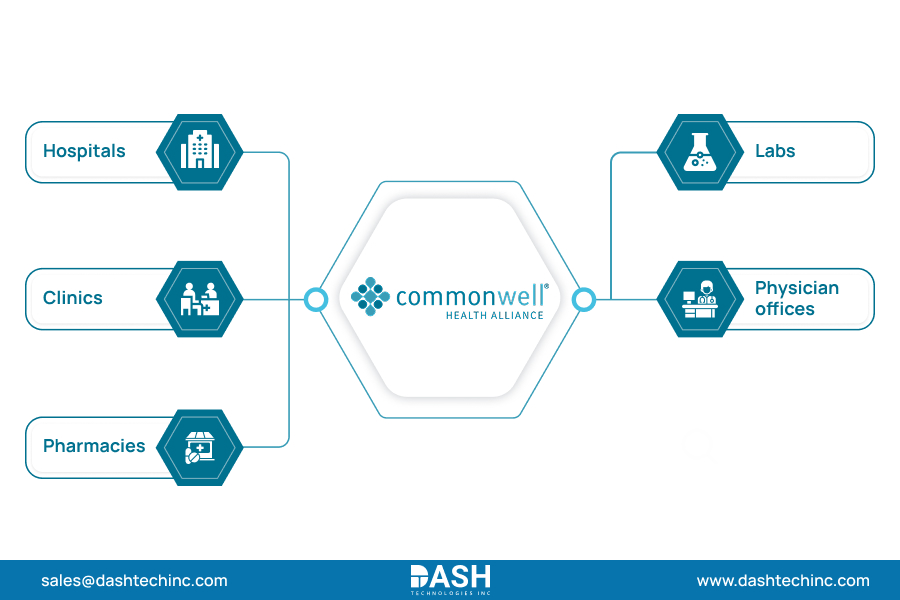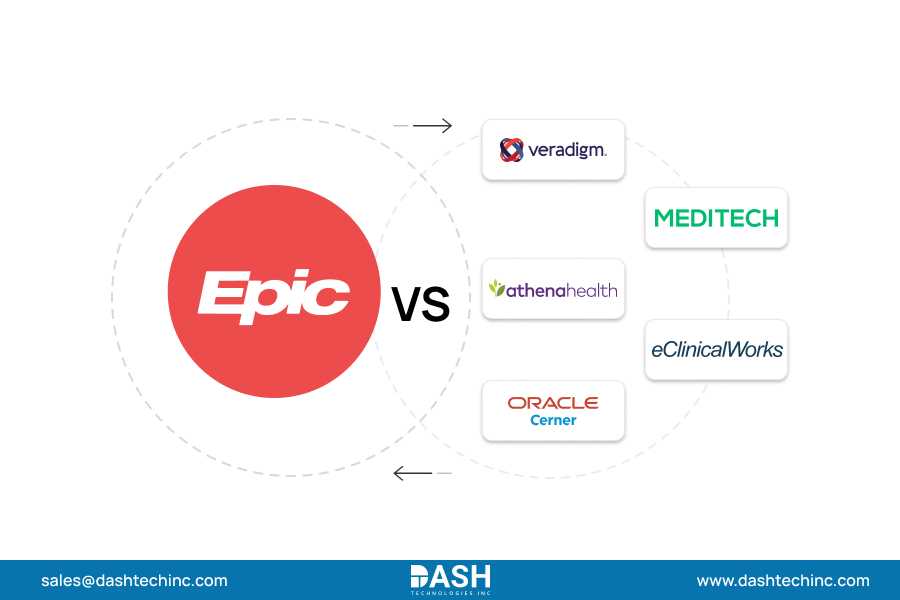Epic EHR Integration vs Other Systems: Comparison Guide 2025
The modern healthcare system functions through interconnected networks that require efficient patient data movement between providers, payers, and patients. This smooth transfer of Electronic Health Records (EHRs) is not just a technological convenience but a necessity for the provision of timely, informed clinical decisions & ultimately, patient improvement. Epic EHR integration is the industry leader in this technology, controlling roughly 42.3% of the acute care market in the US and acting as the foundation for innumerable healthcare institutions.
The Epic EHR system has established complete dominance in EHR integration and stands as the industry’s gold standard. But should you choose the Epic EHR system for your organization? This blog examines Epic alongside other EHR systems to help you understand their key differences and find the best choice for your healthcare requirements.
Epic EHR: The Market Leader’s Foundation
Epic’s dominance is a result of its advanced technical architecture, which is based on the Chronicles database & MUMPS (Massachusetts General Hospital Utility Multi-Programming System). Hyperspace, the system’s front-end interface, offers extensive functionality for administrative and clinical tasks. The core of Epic’s integration strategy is its Care Everywhere platform, which facilitates real-time data sharing between Epic systems in various healthcare institutions.
Organizations can deploy Epic using on-premises hosting solutions or through Epic Cloud Hosting and third-party cloud vendor options. Epic Showroom (formerly known as App Orchard) is Epic’s official certified integration marketplace, & it is where Epic EHR integration partners are offered solutions for advanced features.
The architecture delivers outstanding availability and performance but faces integration challenges due to its proprietary design. The system offers multiple connectivity options through Web Services, SOAP, RESTful APIs, and HL7 & FHIR standards to connect with external systems. Through its multi-protocol strategy, Epic delivers uninterrupted integration to various healthcare platforms while continuing to demonstrate reliable performance. The burden on Epic integration cost can become substantial due to licensing expenses, as well as the need for system customization and specialized implementation resources to achieve effective interoperability.
Everything You Need to Know About Epic EHR
Discover how to overcome common challenges and maximize the benefits of Epic EHR integration with our easy-to-follow expert guide.
Get Your Free CopyComparing Epic with Major EHR Competitors
Oracle Health (Cerner) EHR Integration
Following Oracle’s $28.3 billion acquisition in 2022, Cerner operates as Oracle Health & maintains its significant 21.7% market share in acute care. The service-oriented architecture of Cerner Millennium combines Java middleware & Oracle databases as an approach that contrasts with Epic’s system design. The system employs a Message Exchange Format (MXF) to enable communication between applications while demonstrating its commitment to open interoperability through membership in the CommonWell Health Alliance.
Cerner’s integration strategy prioritizes accessibility and flexibility. The organization established the CommonWell Health Alliance, a non-profit industry trade association permitting member organizations to exchange data without any barriers. The Ignite APIs from Cerner enable third-party integrations, while Seamless Exchange brings together patient data from various EHR sources into an integrated whole patient record.
Cerner systems are easier to integrate from a complexity perspective because they offer fewer features than Epic systems. Cerner is more flexible in terms of third-party integration & supports more accessible APIs, which means it is simpler to integrate different systems for an organization. Open systems like Cerner can cause technical problems and stability problems unlike Epic’s tightly managed system.
Explore Our Detailed Comparison: Epic EHR vs. Cerner in 2025

Veradigm (Allscripts) EHR Integration
Veradigm (formerly Allscripts) specializes in improving clinical workflow for small—to medium-sized practice providers. This EHR platform delivers essential functionalities such as intelligent appointment scheduling and patient engagement solutions while emphasizing user experience. Allscripts’s distinguishing feature is its user-friendly cloud interface, enabling healthcare providers to make quick adjustments without comprehensive training.
The platform supports integration with multiple healthcare fields, such as practice management, revenue cycle management, and clinical decision support. Allscripts’ focus on optimizing workflows alongside user-friendly design positions it as a desirable solution for orgs that value straightforward usability & efficient implementation.
If you want something different from Epic and Cerner, Allscripts is a good choice, particularly if you’re looking for affordable options that integrate well with other systems. They have several ways to connect to different applications, whether it’s through traditional interfaces, APIs, or pre-built apps. Each option has its perks depending on what your organization needs and your tech setup.
Meditech EHR Integration
For over 50 years, Meditech has earned a good reputation among small to mid-sized healthcare organizations, holding about 13.2% of the market share. They offer user-friendly software with solid features for telehealth, billing, practice management, and communication. The platform’s telehealth capabilities include Expanse Virtual Care, which provides seamless remote communication and ensures uninterrupted access during system downtime.
The Meditech EHR integration strategy highlights security and compliance features through a HIPAA-compliant systems architecture, encryption protocols for data transmission and storage, and strict access control measures. Healthcare organizations requiring strict data protection & operating under high regulatory standards find Meditech’s security-focused approach ideal.
Meditech promotes affordable solutions through its pricing strategy, which offers setup fees for large hospitals between $7 million and $20 million, a rate much lower than Epic’s enterprise-level pricing. The transparent pricing model makes the system highly appealing for budget-conscious organizations needing dependable EHR service without major customization.
Athenahealth EHR Integration
Athenahealth stands out by offering a cloud-based EHR known as athenaOne. Instead of charging flat licensing fees, it operates on a model that’s based on a percentage of collections, which makes it appealing for providers who want to grow without spending a lot on infrastructure. Through web-based deployment, the platform lowers infrastructure costs while delivering predictable pricing for small healthcare practices.
Athenahealth strongly advocates interoperability. Upon activation, athenaOne users gain immediate access to a comprehensive interoperable network. Providers receive instantaneous entry to more than 277,000 clinical integrations built into the platform, including direct connections to labs, imaging centers, and pharmacies.
Recent news shows that Athenahealth is committed to innovation. In February 2025, they teamed up with Abridge to bring in AI features for better documentation in outpatient care, like AI-powered ambient listening and scribing tools. In October 2024, they rolled out AI-powered Ambient Notes in their EHR, which helps make clinical documentation easier by automatically creating patient notes during visits.
eClinicalWorks EHR Integration
eClinicalWorks, a cloud-based EHR, maintains a major market share of 16.25% in the EHR arena while leading the way in interoperability efforts. The organization accomplished integration with Epic systems through the Carequality framework, enabling real-time data sharing across systems encompassing over 1,000 hospitals and 40,000 clinics.
The platform excels in AI capabilities through Sunoh.ai, which transcribes medical conversations, ChatGPT-powered AI, which manages voice/text interactions, and Image AI Assistant, which automates fax processing. Healthcare providers benefit from AI tools that automate documentation and scheduling and ease administrative responsibilities. eClinicalWorks is a good choice for outpatient practices looking for AI solutions to improve workflows & patient interactions.

Choosing the Right EHR
Multiple factors determine the appropriate EHR system selection:
Organization Size:
- Large Health Systems: Choose Epic EHR software for its robust Epic integration, interoperability tools like Care Everywhere, and advanced analytics. Cerner is a flexible, cost-effective alternative.
- Community Hospitals: Meditech provides cost-effective integration solutions designed for regional healthcare networks. Allscripts provides an open platform that suits smaller healthcare systems.
- Small Practices: Athenahealth and eClinicalWorks deliver affordable, cloud-based platforms starting at $449/mo/provider.
- Ambulatory Practices: Select Athenahealth or eClinicalWorks because they both provide cloud-based platforms with robust third-party integration and AI tools including Sunoh.ai.
Budget:
- Epic and Cerner require sizable investments suitable for organizations operating under large budgets while targeting long-term ROI.
- Allscripts, Meditech, Athenahealth, and eClinicalWorks are more affordable.
Specialty Needs: Meditech & eClinicalWorks create specialty-specific workflow solutions that address the needs of various medical fields. However, every EHR is customization-friendly to a certain extent.
Choose the Right EHR Integration Partner:
By teaming up with seasoned EHR integration provider like Dash Technologies you can experience a greatly simplified implementation process. We provide Epic integration and EHR systems knowledge to deliver smooth data migration, regulatory compliance, and workflow optimization customized to meet your organization’s requirements.
Our services consist of phased implementation, API monitoring, and cloud-based solutions that address frequent integration issues, including legacy system compatibility and data synchronization. Contact us now to learn how we can help you achieve better healthcare results.
About Dash

Dash Technologies Inc.
We’re technology experts with a passion for bringing concepts to life. By leveraging a unique, consultative process and an agile development approach, we translate business challenges into technology solutions Get in touch.







